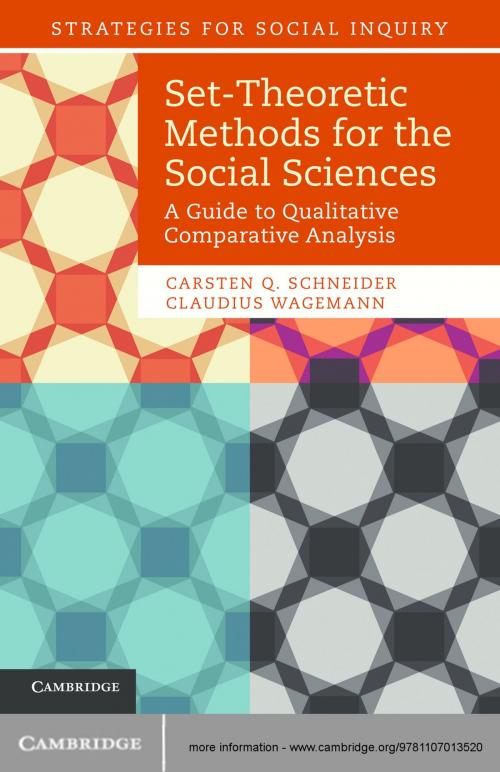Set-Theoretic Methods for the Social Sciences
A Guide to Qualitative Comparative Analysis
Nonfiction, Reference & Language, Reference, Social & Cultural Studies, Political Science, Social Science| Author: | Carsten Q. Schneider, Claudius Wagemann | ISBN: | 9781139564267 |
| Publisher: | Cambridge University Press | Publication: | August 30, 2012 |
| Imprint: | Cambridge University Press | Language: | English |
| Author: | Carsten Q. Schneider, Claudius Wagemann |
| ISBN: | 9781139564267 |
| Publisher: | Cambridge University Press |
| Publication: | August 30, 2012 |
| Imprint: | Cambridge University Press |
| Language: | English |
Qualitative Comparative Analysis (QCA) and other set-theoretic methods distinguish themselves from other approaches to the study of social phenomena by using sets and the search for set relations. In virtually all social science fields, statements about social phenomena can be framed in terms of set relations, and using set-theoretic methods to investigate these statements is therefore highly valuable. This book guides readers through the basic principles of set theory and then on to the applied practices of QCA. It provides a thorough understanding of basic and advanced issues in set-theoretic methods together with tricks of the trade, software handling and exercises. Most arguments are introduced using examples from existing research. The use of QCA is increasing rapidly and the application of set-theory is both fruitful and still widely misunderstood in current empirical comparative social research. This book provides the comprehensive guide to these methods for researchers across the social sciences.
Qualitative Comparative Analysis (QCA) and other set-theoretic methods distinguish themselves from other approaches to the study of social phenomena by using sets and the search for set relations. In virtually all social science fields, statements about social phenomena can be framed in terms of set relations, and using set-theoretic methods to investigate these statements is therefore highly valuable. This book guides readers through the basic principles of set theory and then on to the applied practices of QCA. It provides a thorough understanding of basic and advanced issues in set-theoretic methods together with tricks of the trade, software handling and exercises. Most arguments are introduced using examples from existing research. The use of QCA is increasing rapidly and the application of set-theory is both fruitful and still widely misunderstood in current empirical comparative social research. This book provides the comprehensive guide to these methods for researchers across the social sciences.















